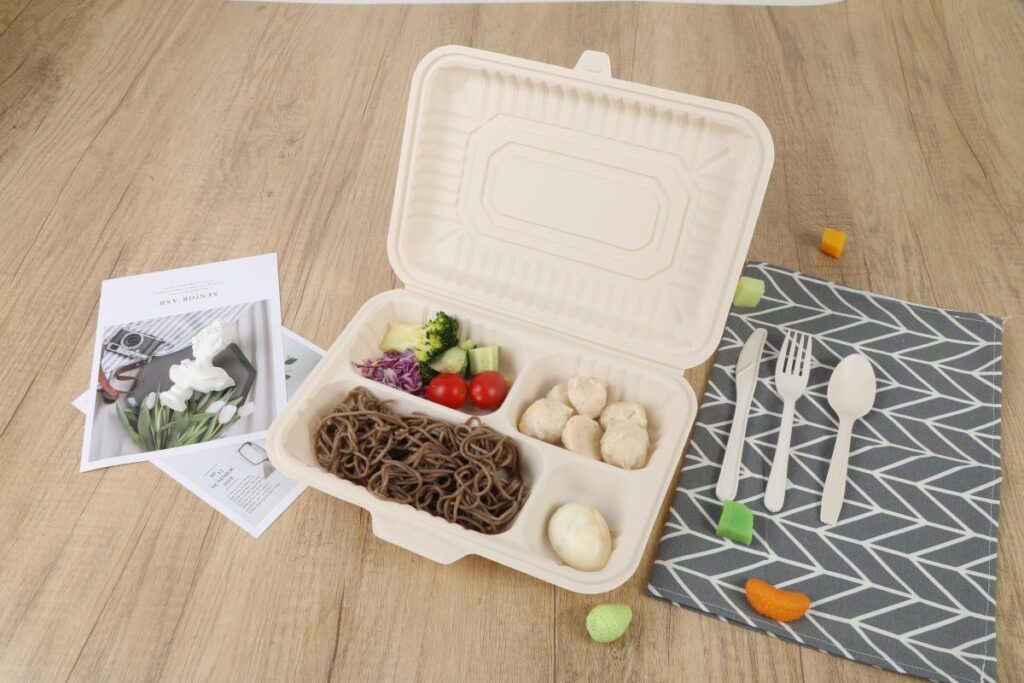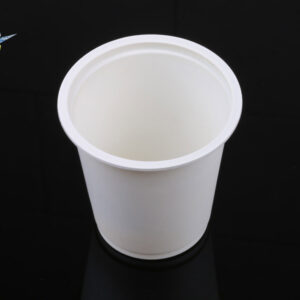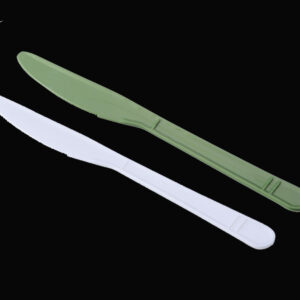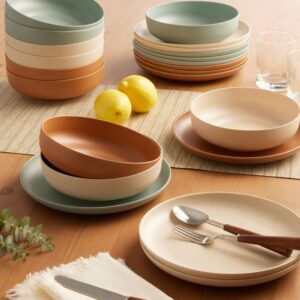In an era where environmental consciousness is not just a trend but a necessity, the shift towards eco-friendly tableware represents a significant step in sustainable living. This article explores the innovative approaches and materials in developing eco-friendly silver, its impact on public policy, and the cultural shift towards sustainable dining practices.

Material Innovation in Eco-Friendly Tableware
The quest for sustainable alternatives to traditional tableware materials has led to remarkable innovations. Materials such as bamboo, straw, sugarcane fiber, and biodegradable plastics are at the forefront of this revolution. These materials are environmentally friendly and offer unique aesthetic and functional qualities.
Bamboo: The Green Gold
Bamboo is fast becoming a popular material for eco-friendly tableware. It is a sustainable choice due to its rapid growth rate and ability to thrive without pesticides. Bamboo tableware is durable, lightweight, and naturally resistant to bacteria, making it ideal for home and commercial use.
Bioplastics: The Future of Sustainable Tableware
Bioplastics are emerging as a viable alternative to traditional plastics, made from natural materials such as corn starch. These biodegradable plastics decompose much faster than conventional plastics and have a significantly lower carbon footprint. Products made from bioplastics are robust and versatile, suitable for a range of tableware items.
Zero Waste Dining Experience
Creating a zero-waste dining experience is a holistic approach beyond using eco-friendly tableware. It involves rethinking the entire dining process, from food preparation to waste management.
The Role of Restaurants and Food Services
Restaurants and food services play a crucial role in promoting zero-waste dining. By adopting eco-friendly tableware, they can significantly reduce their environmental impact. Many companies are moving towards a model of a circular economy, in which waste is minimised and resources are re-used or recycled.
Consumer Participation in Zero Waste Practices
Consumer awareness and participation are crucial for the success of zero-waste dining. Educating customers about the benefits of eco-friendly tableware and encouraging them to make sustainable choices can profoundly impact reducing waste.
Eco-Friendly Tableware and Public Policy
Integrating eco-friendly tableware into public policy is a critical step towards environmental sustainability. Governments worldwide are recognizing the importance of sustainable dining practices and implementing measures to encourage the use of eco-friendly alternatives.
Legislation and Incentives
Many countries have introduced legislation to reduce the use of single-use plastics, which includes traditional plastic tableware. These laws often incentivize businesses and consumers to switch to eco-friendly options. Governments promote this shift through subsidies, tax breaks, and grants.
Impact on Consumer Behavior and Industry
These policies significantly impact consumer behavior, driving a shift towards more sustainable dining practices. They also encourage innovation in the industry, as manufacturers seek to develop new materials and products that comply with environmental regulations.
Combining Design and Functionality
Fusing design and functionality in eco-friendly tableware is not just about creating environmentally friendly products. It’s also about crafting aesthetically pleasing items that enhance the dining experience.
Aesthetic Appeal
Designers are now focusing on creating eco-friendly tableware that is visually appealing. The use of natural materials often lends a unique and organic look to these products, making them desirable not just for their sustainability but also for their design.
User Experience
The functionality of eco-friendly tableware is paramount. Designers are working to ensure that these products are environmentally sustainable and practical for everyday use. This includes focusing on durability, ease of cleaning, and suitability for different types of food.
Lifecycle Analysis of Eco-Friendly Tableware
Understanding the entire lifecycle of eco-friendly tableware, from production to disposal, is crucial in assessing its environmental impact.
Production Process
The production process of eco-friendly tableware involves sourcing sustainable materials and using manufacturing practices with minimal environmental footprint. This includes reducing energy consumption, minimizing waste, and avoiding harmful chemicals.
End of Life
The disposal of eco-friendly tableware is as important as its production. Biodegradable materials reduce their impact on landfill and the environment by being designed to break down naturally. Recycling and composting are also critical components of managing the end-of-life of these products.
Cultural and Social Dimensions of Eco-Friendly Tableware
The shift towards eco-friendly tableware is not just a matter of environmental responsibility; it also reflects broader social and cultural changes. This movement towards sustainability is reshaping how societies view dining and ecological stewardship.
Reflecting Social and Cultural Values
Eco-friendly tableware is becoming a symbol of a society’s commitment to sustainability. It reflects a growing awareness of environmental issues and a collective effort to address them. In many cultures, using sustainable products like eco-friendly tableware is becoming a norm, a part of the lifestyle that signifies responsibility and respect for the planet.
Acceptance and Usage Across Different Cultures
The acceptance and use of eco-friendly tableware vary across different cultures. In some regions, there is a strong tradition of using natural materials, making the transition to eco-friendly options more seamless. In others, raising awareness and changing long-standing habits can be more challenging. Understanding these cultural nuances is crucial for promoting the global adoption of eco-friendly tableware.
Eco-Friendly Tableware in Education and Awareness
Educational initiatives play a vital role in increasing public awareness about the importance of eco-friendly tableware. These efforts are crucial in shaping future consumer behavior and promoting sustainable practices.
Educational Campaigns and Programs
Schools, non-profit organizations, and businesses are launching campaigns and programs to educate people about the benefits of eco-friendly tableware. These initiatives often focus on the environmental impact of single-use plastics and the advantages of sustainable alternatives.
Community Engagement
Engaging communities in discussions and activities related to eco-friendly tableware can have a significant impact. Community events, workshops, and demonstrations allow people to learn about and experience the benefits of sustainable dining practices firsthand.
The Role of Technology in Eco-Friendly Tableware
Advancements in technology are playing a pivotal role in developing eco-friendly tableware. From manufacturing processes to new material innovations, technology is driving the evolution of sustainable dining solutions.
3D Printing and Biodegradable Technologies
3D printing technology opens new possibilities for eco-friendly tableware design and production. It allows for creating complex shapes and techniques that were previously impossible. Additionally, advancements in biodegradable materials lead to more sustainable options that break down naturally without harming the environment.
Impact on the Industry
These technological advancements are not only beneficial for the environment but also for the tableware industry. They drive innovation, reduce production costs, and create new market opportunities. We expect to see even more exciting developments in eco-friendly tableware as technology evolves.
Conclusion: Embracing a Sustainable Future
The movement towards eco-friendly tableware is more than just a trend; it’s a necessary shift towards a more sustainable future. By embracing innovations in materials, design, and technology and recognizing the importance of cultural and educational factors, we can significantly impact our environment. Eco-friendly tableware is not just about what we eat with; it’s about making a conscious choice for the planet and future generations.







